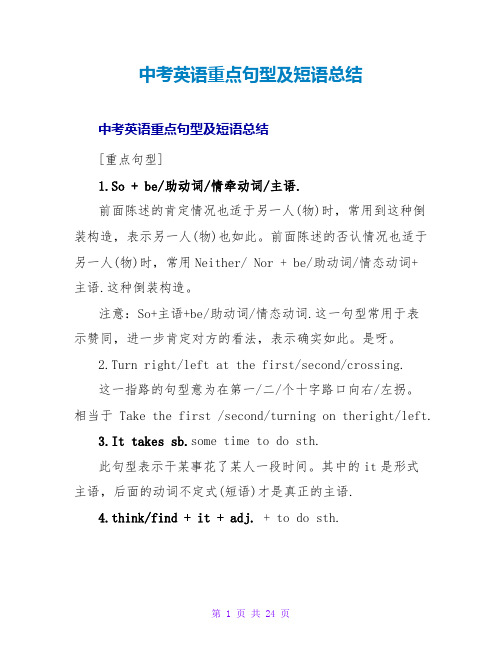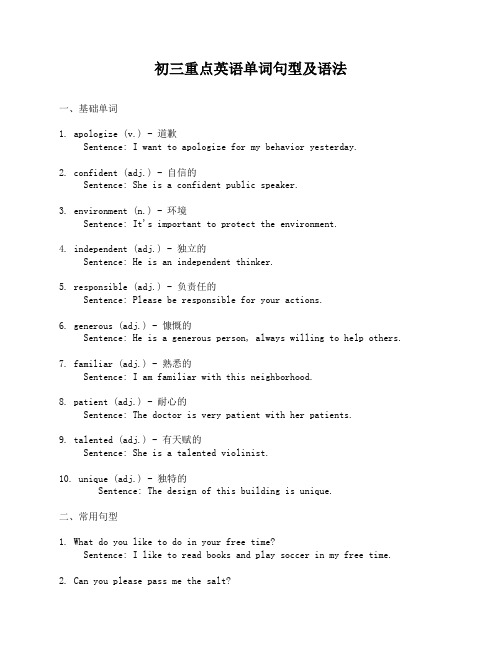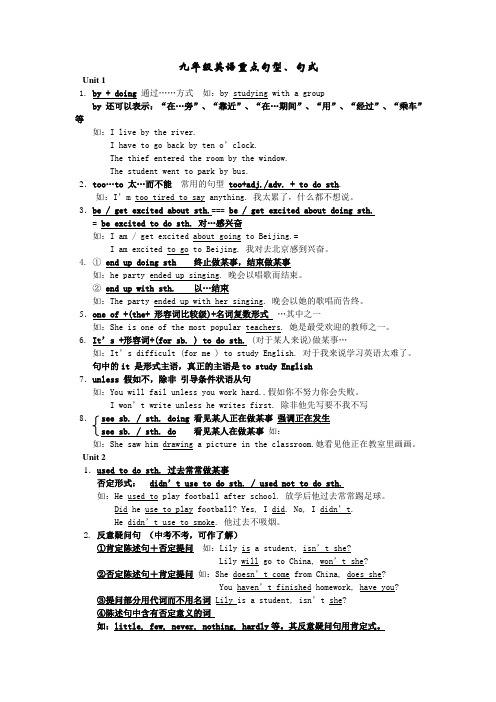中考英语教研重点句型汇总
中考英语重点句型及短语总结

中考英语重点句型及短语总结中考英语重点句型及短语总结[重点句型]1.So + be/助动词/情牵动词/主语.前面陈述的肯定情况也适于另一人(物)时,常用到这种倒装构造,表示另一人(物)也如此。
前面陈述的否认情况也适于另一人(物)时,常用Neither/ Nor + be/助动词/情态动词+主语.这种倒装构造。
注意:So+主语+be/助动词/情态动词.这一句型常用于表示赞同,进一步肯定对方的看法,表示确实如此。
是呀。
2.Turn right/left at the first/second/crossing.这一指路的句型意为在第一/二/个十字路口向右/左拐。
相当于Take the first /second/turning on theright/left.3.It takes sb.some time to do sth.此句型表示干某事花了某人一段时间。
其中的it是形式主语,后面的动词不定式(短语)才是真正的主语.4.think/find + it + adj. + to do sth.此句型中的it是形式宾语,不可用其它代词替代,形容词作宾语的补足语,后面的动词不定式(短语)才是真正的宾语。
5. sth.使某人不受某事侵袭或伤害6. to ike enjoys collecting sts . So do I.迈克喜欢集邮.我也也喜欢.38. The more, the better . 越多越剧好.39. Thanks for doing sth.谢谢你做了某事.40. It is said that.. 据说重点短语1. (see 、hear 、notice 、find 、feel 、listento 、 look at (感官动词)+ doeg :I like y father is used to getting up early 我爸爸习惯早起 He is used to sleeping in class 他习惯上课睡觉eg : I borroe(as) = not different(from) 表一样81.bother 打搅 bother sb to do stheg : Im sorry to bother you ,but can you tell me to old e in 进来93.decide to do sth 决定做某事94.do a survey of 做某方面的调查95.do better in 在方面做得更好96.do ind +doing /从句 /名词不要介意99.each +名(单)每一个 eg : Each student has many books 每一个学生都有一些书中考文言文复习之重点虚词总结中考文言文复习之重点虚词总结一、之1、作助词用。
初中英语重点句型、短语(中考必背!)

[短语、词组归纳]由动词开头构成的短语、词组很多。
复习时应分类处理:一、动词+介词1.look at…看…,look like … 看上去像……,look after …照料… 2.listen to…听……3.welcome to…欢迎到……4.say hello to …向……问好5.speak to…对……说话此类短语相当于及物动词,其后必须带宾语,但宾语无论是名词还是代词,都要放在介词之后。
二、动词+副词“动词+副词”所构成的短语义分为两类:A.动词(vt.)+副词1.put on 穿上 2.take off脱下 3.write down记下此类短语可以带宾语,宾语若是名词,放在副词前后皆可;宾语若是人称代词,只能放在副词的前面。
B.动词(vi)+副词。
1.come on赶快 2.get up起床 3.go home回家4.come in进来 5.sit down坐下 6.stand up起立此类短语属于不及物动词,不可以带宾语。
三、其它类动词词组1.close the door2.1ook the same3.go to work/class4.be ill5.have a look/seat6.have supper7.1ook young 8.go shopping 9.watch TV/games10. play games[介词短语聚焦]“介词+名词/代词”所构成的短语称为介词短语。
现将Unitsl-16常用的介词短语按用法进行归类。
1.in+语言/颜色/衣帽等,表示使用某种语言或穿着……。
2.in + Row/ Team/ Class/ Grade等,表示“在……排/队/班级/年级”等。
3.in the morning/ afternoon/ evening/ 表示“在上午/下午/傍晚”等一段时间。
4.in the desk/ pencil-box/bedroom 等表示“在书桌/铅笔盒/卧室里”。
初三重点英语单词句型及语法

初三重点英语单词句型及语法一、基础单词1. apologize (v.) - 道歉Sentence: I want to apologize for my behavior yesterday.2. confident (adj.) - 自信的Sentence: She is a confident public speaker.3. environment (n.) - 环境Sentence: It's important to protect the environment.4. independent (adj.) - 独立的Sentence: He is an independent thinker.5. responsible (adj.) - 负责任的Sentence: Please be responsible for your actions.6. generous (adj.) - 慷慨的Sentence: He is a generous person, always willing to help others.7. familiar (adj.) - 熟悉的Sentence: I am familiar with this neighborhood.8. patient (adj.) - 耐心的Sentence: The doctor is very patient with her patients.9. talented (adj.) - 有天赋的Sentence: She is a talented violinist.10. unique (adj.) - 独特的Sentence: The design of this building is unique.二、常用句型1. What do you like to do in your free time?Sentence: I like to read books and play soccer in my free time.2. Can you please pass me the salt?Sentence: Sure, here you go.3. I'm sorry, but I can't attend the party tonight.Sentence: That's okay, maybe next time.4. How was your weekend?Sentence: My weekend was great, I went hiking with my family.5. Could you please help me with my homework?Sentence: Of course, I would be happy to help.6. What time does the movie start?Sentence: The movie starts at 7:30 PM.7. Where is the nearest bus stop?Sentence: The nearest bus stop is just around the corner.8. I'm really excited about the school trip next week.Sentence: Me too, it's going to be a lot of fun.9. What do you want to be when you grow up?Sentence: I want to be a doctor and help people.10. How do you spell your name?Sentence: My name is spelled J-O-H-N.三、语法1. Present Simple Tense (一般现在时)- 表示经常发生的动作或事实。
中考英语重点句型及短语总结7篇

中考英语重点句型及短语总结7篇篇1一、引言中考英语作为学生们学业生涯中的一项重要考试,掌握其中的重点句型和短语显得尤为重要。
本文旨在总结中考英语中的常见重点句型及短语,帮助考生更好地备考,提高语言应用能力。
二、重点句型1. 陈述句陈述句是英语中最基本的句型,用于表达事实、观点等。
常见的陈述句有:It is + 形容词+ to do sth;This is a + 形容词+ 名词。
例句:It is important to learn English well. (学好英语很重要。
)2. 疑问句疑问句用于询问信息。
特殊疑问句以特殊疑问词开头,如what、where、when等。
例句:Where did you go last night? (你昨晚去哪里了?)3. 感叹句感叹句用于表达强烈的情感。
常见的感叹句有:How + 形容词+ a/an + 名词!;How + 形容词/副词!例句:How beautiful the flower is! (这朵花多美啊!)4. 祈使句祈使句用于表达请求、命令等。
常见的祈使句以动词原形开头。
例句:Please close the door. (请关门。
)三、重点短语1. a bit of 一点例句:I have a bit of homework to do. (我有一点儿作业要做。
)2. all over 遍布例句:The news spread all over the town. (这个消息传遍了整个城镇。
)3. be able to 能够例句:I am able to speak three languages. (我会说三种语言。
)4. because of 由于二、重点句型的应用与实例分析除了上述总结的重点句型外,还有许多常用句型如宾语从句、表语从句等。
这些句型在中考英语中的应用非常广泛,考生需要熟练掌握。
下面以宾语从句为例,分析其应用与实例。
宾语从句是英语中一种常见的句型,用于表达一个句子中的另一个句子的内容。
初三英语句型总结

初三英语句型总结一、基本句型1. 主语 + 谓语动词例如:Tom runs every morning.2. 主语 + 谓语动词 + 宾语例如:I eat an apple.3. 主语 + 谓语动词 + 间接宾语 + 直接宾语例如:She gave me a book.4. 主语 + 谓语动词 + 宾语 + 宾语补足语例如:We made him happy.5. 主语 + 谓语动词 + 宾语 + 宾语补足语 + 宾语补足语补充说明语例如:They elected him captain.6. 主语 + 系动词 + 表语例如:The flowers are beautiful.7. 主语 + 系动词 + 表语补足语例如:He is a student.8. 主语 + 系动词 + 表语 + 表语补足语例如:She became a doctor.二、特殊句型1. 主语 + 动词 + 不定式例如:She wants to go shopping.2. It is/was + 形容词 + (for/of sb.) + to do sth.例如:It is difficult for me to understand.3. 反身代词 + 谓语动词例如:He hurt himself.4. 主语 + can/could/may/might + 动词原形例如:I can swim.5. 主语 + must/should/ought to + 动词原形例如:You should listen to your parents.6. 主语 + have/has/had better + 动词原形例如:We had better go home now.7. It takes sb. some time + to do sth.例如:It takes me half an hour to finish my homework.8. 主语 + be + adj. + to do sth.例如:It is important for us to learn English well.9. 助动词/情态动词 + not + 谓语动词例如:She does not like playing basketball.10. Would you like + 不定式?例如:Would you like to have some cake?三、状语从句1. if引导的条件状语从句例如:If it doesn't rain tomorrow, we will go hiking.2. when/as引导的时间状语从句例如:When I was young, I liked playing with my friends.3. while引导的并列时间状语从句例如:He listened to music while he was doing his homework.4. before/after引导的时间状语从句例如:Before I go to bed, I always brush my teeth.5. because/since/as引导的原因状语从句例如:As she was tired, she went to bed early.6. as if/though引导的方式状语从句例如:He talks to me as if he knows everything.7. unless/if not引导的条件状语从句例如:Unless you study hard, you won't pass the exam.8. while引导的对比状语从句例如:He is working hard while his classmates are playing games.四、句型转换1. 肯定句变否定句:在谓语动词前加not或don't/doesn't/didn't例如:I like swimming. → I don't like swimming.2. 否定句变肯定句:去掉not或don't/doesn't/didn't例如:He doesn't play basketball. → He plays basketball.3. 一般疑问句变否定句:将助动词/情态动词放在句首,加not,主语提前例如:Do you like ice cream? → Don't you like ice cream?4. 否定句变一般疑问句:将助动词/情态动词放在句首,主语提前例如:She doesn't go to school. → Doesn't she go to school?5. 特殊疑问句变陈述句:用陈述句的语序表示特殊疑问句的含义例如:Where do you live? → I live in Beijing.6. 变间接引语:将直接引语改为间接引语,注意时态和人称的变化例如:He said, "I am hungry." → He said that he was hungry.7. 变直接引语:将间接引语改为直接引语,注意时态和人称的变化例如:She told me that she loved me. → "I love you," she told me.以上是初三英语句型的总结,希望对你有所帮助!。
史上最全九年级英语重点句型、句式_归纳总结

九年级英语重点句型、句式Unit 11. by + doing通过……方式如:by studying with a groupby 还可以表示:“在…旁”、“靠近”、“在…期间”、“用”、“经过”、“乘车”等如:I live by the river.I have to go back by ten o’clock.The thief entered the room by the window.The student went to park by bus.2.too…to 太…而不能常用的句型too+adj./adv. + to do sth.如:I’m too tired to say anything. 我太累了,什么都不想说。
3.be / get excited about sth.=== be / get excited about doing sth.= be excited to do sth. 对…感兴奋如:I am / get excited about going to Beijing.=I am excited to go to Beijing. 我对去北京感到兴奋。
4. ①end up doing sth 终止做某事,结束做某事如:he party ended up singing. 晚会以唱歌而结束。
②end up with sth. 以…结束如:The party ended up with her singing. 晚会以她的歌唱而告终。
5.one of +(the+ 形容词比较级)+名词复数形式…其中之一如:She is one of the most popular teachers. 她是最受欢迎的教师之一。
6. It’s +形容词+(for sb. ) to do sth. (对于某人来说)做某事…如:It’s difficult (for me ) to study English. 对于我来说学习英语太难了。
初中英语重点句型、短语中考教育必背
前李朱指导学校初三英语专项初中英语要点短语、句型汇总[短语、词组概括]由动词开头构成的短语、词组好多。
复习时应分类办理:一、动词+介词.lookat看,looklike看上去像,lookafter照顾.listento听.welcometo欢迎到.sayhelloto向问好.speakto对说话此类短语相当于及物动词,后来一定带宾语,但宾语不论是名词仍是代词,都要放在介词以后。
二、动词+副词“动词+副词”所构成的短语义分为两类:A.动词(vt.)+副词1.puton 穿上2.takeoff 脱下3.writedown 记下此类短语能够带宾语,宾语若是名词,放在副词前后皆可;宾语若是人称代词,只好放在副词的前方。
B.动词(vi)+副词。
1.comeon赶忙2.getup 起床3.gohome回家4.comein进来5.sitdown 坐下6.standup 起立此类短语属于不及物动词,不可以够带宾语。
三、其余类动词词组thedoorthesametowork/classillalook/seatsupperyoungshoppingTV/gamesplaygames[介词短语聚焦]“介词+名词/代词”所构成的短语称为介词短语。
现将Unitsl-16常用的介词短语按用法进行归类。
1.in+语言/颜色/衣帽等,表示使用某种语言或衣着。
2.in+Row/Team/Class/Grade等,表示“在排/队/班级/年级”等。
3.inthemorning/afternoon/evening/表示“在上午/下午/夜晚”等一段时间。
4.inthedesk/pencil-box/bedroom等表示“在书桌/铅笔盒/寝室里”。
5.inthetree表示“在树上(非树自己全部)”;onthetree表示“在树上(为树自己全部)”。
6.inthewall表示“在墙上(凹陷进去)”;onthewall表示“在墙上(指墙的1前李朱指导学校初三英语专项表面)”。
中考英语常见120个重点句型整理
中考英语常见120个重点句型整理句型1:There+be+主语+地点状语/ 时间状语There sa boat in the river.河里有条船。
句型2:I think “我认为.…” 否定式 I don t think...Ithink he is a good student.我认为他是个好学生。
Idon t think any of them is interesting.我认为他们中任何一个都无趣。
句型3:too...to..… 太……而不能...He istoo young to go to school.他太小了不能去学校。
句型4:It takes sb some time to dosth“干某事花了某人一段时间”,it是形式主语,后面的动词不定式(短语)才是真正的主语。
It takes him four hours to finish his homework.写作业花费了他四个小时。
句型5:Though...+主句Though I like writing to my pen-friend,it takes a lot of time.虽然我喜欢给笔友写信,但它要耗费我大量时间。
句型6:What about...?/How about...?“.…怎么样?”,about 为介词,其后须接名词、代词或 V-ing 等形式What about another cake? 再吃块蛋糕好吗?How about going out for a walk? 出去散散步好吗?句型7:What s wrong with+sb. / sth. ?此句型相当于What s the matter/trouble with.后+某物作宾语时,意为“某物出什么毛病了?”后+某人作宾语时,意为“某人怎么了?”What s wrong with your watch?你的手表有什么毛病?句型8:How do you like...?How do you like China?你觉得中国怎么样?句型9:What do you like about...?What do you like about China?你喜欢中国的什么?句型10:How+adj. / adv. +主语+谓语 !What a/ an+adj. +n. +主语+谓语 !How cold it is today!今天多冷啊!What a fine picture it is!多美的一幅图画呀!句型11:had better (not)+动词原形You d better ask that policeman over there.你最好去问问那边的那个警察。
2024年中考英语一轮复习形容词和副词的比较级最高级句型和注意点总结与练习
2024届九年级英语中考一轮复习【语法专题】形容词和副词的比较级最高级句型和注意点总结与练习九年级英语教研室整理形容词和副词的比较级、最高级句型(1)形容词及副词比较级的句型:①比较级+than…:…比…较为…。
即:“A+动词+形容词或副词比较级+than+B”。
两者相比较,A比B更…一些。
eg:His brother is younger than I(me).他弟弟比我年轻。
Beijing is more beautiful than Wuhan.北京比武汉更漂亮。
注意:在比较级前有时可加一些修饰语,如much,a lot,a little,still,even等以示强调或加强语气。
eg:This box is a little heavier than yours.这个箱子比你的要稍重一些。
This movie is much more interesting than that one.这部影片比那部有趣得多。
②as…as:…和…相同。
即:A+动词+as+形容词或副词原级+as+B,表示A和B两者比较,程度相同,“…和…相同”。
eg:My uncle is as tall as your father.我叔叔和你父亲一样高。
My dog is as old as that one.我的狗与那个狗一样大。
③ A+not+as+形容词或副词原级+as+B,表示A,B两者程度不同,即“A不如B那么…”。
eg:My uncle is not as tall as your father.我叔叔不如你父亲高。
Tom is not as honest as John.汤姆不如约翰诚实。
He can't run as /so fast as you.他没你跑得快。
④“比较级+ and +比较级”或“more and more +原级(多音节词和部分双音节词)”,意为“越来越…”。
eg:Our city is more and more beautiful.我们的城市越来越美丽了。
初中英语重点句型归纳
初中英语重点句型归纳一、陈述句型1. 主语 + be动词 + 表语例句:I am a student.2. 主语 + 动词 + 宾语例句:Tom likes playing basketball.3. 主语 + 动词 + 间接宾语 + 直接宾语例句:My mother bought me a new book.4. 主语 + 动词 + 宾语 + 宾语补足语例句:We elected him monitor.5. 主语 + 动词 + 宾语 + 宾语补足语 + 宾语补足语例句:They made him chairman.6. 主语 + do/does + not + 动词原形例句:She does not like swimming.7. Do/Does + 主语 + 动词原形例句:Do you like English?8. 主语 + have/has + 过去分词例句:He has finished his homework.9. 主语 + have/has + not + 过去分词例句:They haven't seen the film yet.10. Have/Has + 主语 + 过去分词例句:Have you ever visited Beijing?11. There be句型例句:There is a book on the desk.12. It be + adj. + 不定式例句:It is important to learn English well.13. It is + adj. + for + 人 + to + 不定式例句:It is difficult for me to solve the math problem.二、疑问句型1. Yes/No问句:句型为:Do/Does + 主语 + 动词原形?例句:Do you like English?2. 特殊疑问句:以特殊疑问词(what, where, when, why, who, how等)开头。
- 1、下载文档前请自行甄别文档内容的完整性,平台不提供额外的编辑、内容补充、找答案等附加服务。
- 2、"仅部分预览"的文档,不可在线预览部分如存在完整性等问题,可反馈申请退款(可完整预览的文档不适用该条件!)。
- 3、如文档侵犯您的权益,请联系客服反馈,我们会尽快为您处理(人工客服工作时间:9:00-18:30)。
中考英语教研重点句型汇总1.as soon as 一……就He called me up as soon as he came back to Beijing.Please call me as soon as you finish your homework.2.not as/so ……as 和……一样;不如I think English is as important as mathsFor me, basketball is as interesting as football.3.as……as possible 尽可能的Kids in the West usually get ready for as many gifts as possible. We should speak English as much as we can in class.4.be afraid of doing sth./that 害怕做某事、害怕担心Children are always afraid of the dark.I used to be afraid of the dark. However, I am not now.5.be busy doing 忙于做某事Mom is always busy cooking when I get home.People in Beijing are busy getting ready for the Olympic Games.6.be famous /late/ready/sorry for… 以……著名He hurried to school yesterday, but he was late for class.Look! The students are getting ready for the sports meeting. 7.both…and两者都Students like both playing basketball and playing soccer.It's a good way to make both teachers and students happy.8.buy/give/show/send/pass/bring/lend/tell sb. sth. 为某人买某物If I were you, I'd give the money to charity.Yesterday Mary's mother bought her a new bike.9.give/show/bring/lend/send/pass/tell sth to sb. 把…给某人Please give this book to him.When you get to your home, please send this letter to your pen pal.10.either…or要么…要么We can't allow him to stay at home, or he will either watch TV or play games. We're going to the park this Saturday, either by bus or by bike.11.enjoy/hate/finish/mind/keep/go on doing 喜欢做某事I kept him reading the text so that he could recite it quickly.Would you please keep holding the picture for me?12.get+比较级变得越来越……The weather is getting warmer and warmer.How do you feel now? Unfortuately, it's getting worse.14.get on with 与…相处It's hard to get on with a bad-tempered person.15.get ready for/ get sth. ready 为……作准备Look! The students are getting ready for the sports meeting.The next station is Dongdan. Please get ready for your arrival.16.had better (not) do 最好做、不做You'd better help your parents do some housework once a week.You'd better not spend more time on this kind of game.17.help sb(to)do/help sb. withThe boy helped the old man to carry a bunch of wood up the hills.He asked me to help him to solve the problem.18.don't think that 认为…不I don't think that they will give up the chance of being volunteers.I don't think that he is reading now.19.I would like to.../ would you like to...?我想做Would you like to lend me your bike?I would like to look up some new words in it.20.It takes sb sometime to do sth. 花费某人...时间做某事It will take the workers two years to build the bridge.It took her 3 months to do this experiment.How long will it take the workers to rebuild the new school?21.It's bad/good for 对...有害处eating more fruit is good for health.Don't read in bed. It's bad for your eyes.22.It's important/impossible/impolite/difficult for sb. to do sth.对于某人来说做...很重要的At school, it's very important for every student to keep their own classrooms clean and tidy.Although it is raining heavily, it looks that it's impossible for him not to finish thelast 200 meters.23. It's time for .../to do sth. 对于...来说做...的时间了It's time for us to borrow books from the library.It's time for Tom to take medicine.24. It's two meters(years)long(old)它两米长(两岁大)He is two meters tall.The river is twenty meters wide.25. keep sb. doing sth 让某人一直做某事The headmaster kept me waiting for two hours last time.Why do you keep laughing all the time?26. keep/make sth. +adj. 让...一直保持...It's important for us to keep calm in danger.The movie was so sad that it made us cry.27. like to do /like doing 喜欢做....My younger sister likes singing and dancing very much.What kind of books does she like reading in her free time?28. make/let sb.(not)do sth. 让某人做/不做某事Make him not lend the book to my younger brother, he will break it.To learn English well, the teacher always makes us read aloud in the morning. 29. neither...nor 既不...也不We should come to the party just at the right time, neither too early nor too late. It's neither too cold, nor too hot here all the year round.30. not... at all 根本不Although life is difficult, each of us doesn't want to give up our hope at all. Some have several girlfriends and others have none at all!31. not only... but also... 不仅...而且Mike not only finished doing his homework but also helped his sister with her English.Today some newly-produced mobile phones can be used not only for taking photos but also for downloading songs from the Internet.32. not... until 直到...才He didn’t stop to have a rest until he finished cleaning the old man's room.I didn't understand my mother's love to me until I talked with her yesterday.33. one ...the other/ some ...others 一个…另一个;一些…另一些These are my two favorite books. One is called The Monkey King, the other is called Harry Potter.Some people say the Indian films are boring, but others say they are great.34. see/hear sb do(doing)sth 看见某人做了/正在做I heard my parents quarreling after supper.I heard someone singing in the next room.I heard someone knock a the door when I was cooking.35. so... that 如此…以至于The noise outside was so big that we couldn't hear what the teacher said.Kate was so angry that she couldn't say a word.36.spend...on(in doing)sth 在…方面花费He spent so much time (in) playing computer games that he was not interested in his lessons.She spends $100 on clothes every week.37. stop/prevent sb. from doing sth. 阻止某人做某事Nothing can stop me from going swimming this afternoon.For years, Mike has kept studying how to stop middle school students from losing themselves in net games.38. stop to do /doing停下来去做某事The boss kept the workers working all the time until they finished all the work. Tell him not to stop to rest; it's important moment now.39. take /bring sth with sb. 随身携带Get the luch which you take with yourself ready, it's time for a meal.My friend brought many chocolates with him to visit me.40.There is something wrong with... 出了问题/毛病There si something wrong with my TV, so we can't watch the match.There's something wrong with my computer. Can you help me?41. too...to 太…以至于不能…Hearing the news of successful launch of Shenzhou-7, many people were too excited to sleep the whole night.The box is too heavy for me to move.42. used to 过去常常She used to spend a lot of time playing computer games.Ther used to be a hospital.43. What about.../How about...? …怎么样呢?How about going out for a walk after supper?I 'm too busy to go tho the movies with you today.How about tomorrow?。
